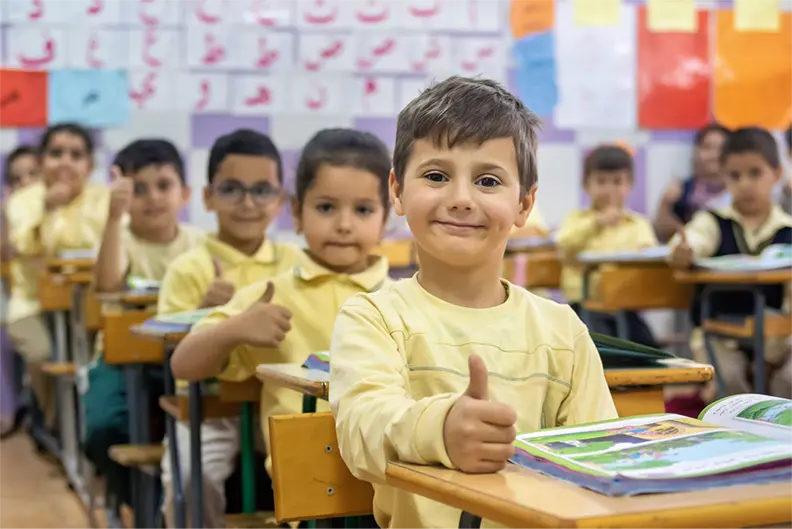As the work of Skills Builder Partnership continues to expand both across the UK and internationally, we’re contributing demonstrably to the UN Sustainable Development Goals (SDGs).
Together, these 17 goals “recognise ending poverty must pair with strategies to build economic growth and address social needs across education, health, social protection, and job opportunities”.
SDG 4 is one of the SDGs that we feed into. Skills Builder directly provides “access to life-long learning opportunities that help individuals acquire the knowledge and skills needed to exploit opportunities and to participate fully in society.”
SDG 4 itself breaks down into 10 targets. These include:
- ensuring that all children receive equitable, affordable, and effective education and early development opportunities
- building relevant employability skills in all young people and adults
- increasing the supply of qualified teachers via international cooperation in teacher training.
The Partnership has been contributing to equality in education for over a decade - in the UK and now across 14 countries globally - and so knows just how valuable teaching essential skills is.
Regardless of country or context, we’re universally seeing learners reap the benefits of essential skills development in their education, work, and wider life. By providing access to lifelong learning and training opportunities, we drive knowledge and skills acquisition, especially in target lower-income countries, and boost employment.
So what does our approach and impact really look like, and how does it work across different settings?
Happy Times Junior School, Uganda,
hosts learners aged 3-14 and has a long history of teaching transferable essential skills to prepare them for the future. They joined the Partnership and Skills Builder Global Accelerator to structure this teaching and measure impact and recently received the Skills Builder Gold Award.
The impact
Children have gained confidence and mutual respect in group tasks. There’s been a change in their listening skills during lessons, leading to improvements in performance. Teachers have also improved their methods of teaching: from teacher-centred to learner-centred. Teacher-pupil-parent relationships have improved.
“We’re proud that our parents and visitors have realised how their children have become so polite. I thank our facilitators of this programme for the knowledge they have imparted in us, and my teachers for the effort and time put in to see that the programme runs smoothly.” - Juliet, Skills Leader at Happy Times
What's next
Happy Times wants to award essential skills certificates in assemblies, train new staff, and continue to reinforce the skills in all lessons.
.jpg)
Policy and curriculum work
In Uganda and Kenya, we’re also working with government agencies and in partnership with British Council to integrate the Skills Builder approach into the national curriculum and assessments.
We’re looking forward to continuing our work in the Ugandan and Kenyan policy spaces - and with other countries’ policymakers - to build essential skills into national and local curriculums and address specific, localised needs and capacities.
Government Girls Model High School Kallur Kot, Pakistan,
was established in 1910. With 580 students aged 11 to 15 years old, the school serves the community of Kallur Kot and its surrounding villages. Its vision is to provide high quality, holistic education and support students to become responsible, global-focused Pakistani citizens. In 2020 it was awarded the International School Award (ISA), and also has received the Skills Builder Gold Award.
The school has welcomed the Global Accelerator, embedding the eight essential skills in school policy and curriculums by making an action plan for the whole school and including each skill in timetables and lesson planning.
The impact
The school has focused on developing and strengthening skills learning. At the start, the Skills Leader and Senior Teacher received online training by the Skills Builder team, who then trained the whole teaching body on the essential skills. They were taught how to use the Skill Builder Hub, how to use online and offline resources, and how to assess students’ progress. Teachers have time every Friday to teach the essential skills and embed each of our six principles of best practice.
What’s next
Government Girls Model High School is always ready to welcome any programme that enables learning and achievement. Next year, it will continue to be a flagship school in Pakistan for Skills Builder and support schools in its province and district to learn more about the Skills Builder approach.

Essential skills for everyone, everywhere
As we work towards 2030 and the realisation of the SDGs, we’re proud to be making a direct and lasting contribution as a Partnership.
The inherent power of essential skills is their universality and ability to be translated across cultures and contexts. What these stories from across the globe demonstrate is how essential skills can help every learner, everywhere, fulfil their potential.





